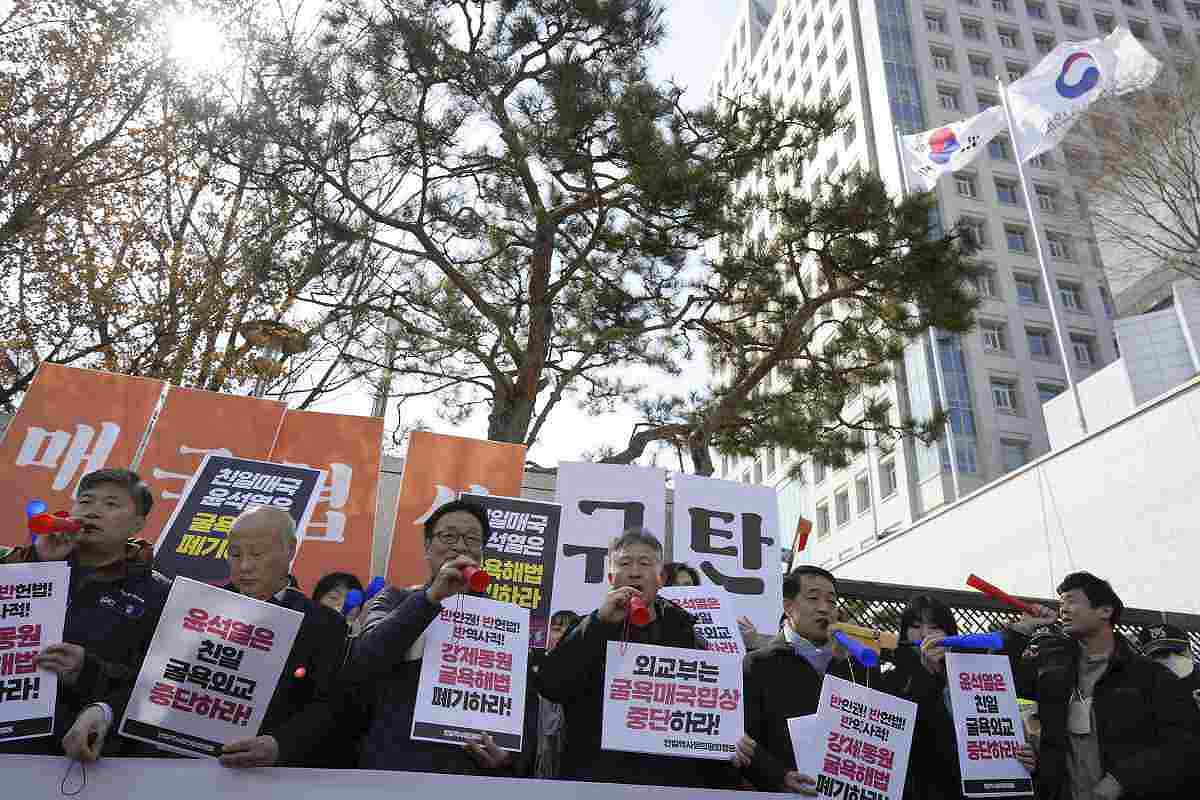
Protesters rally in Seoul on Monday against the South Korean government’s plan to resolve the issue linked to wartime requisitioned labor.
2:00 JST, March 8, 2023
SEOUL — Public opinion in South Korea is split over the South Korean government’s plan to resolve a dispute with Japan concerning lawsuits linked to requisitioned workers from the Korean Peninsula.
How the administration of South Korean President Yoon Suk-yeol handles deep-rooted opposition to the plan will be a focus of attention moving forward.
In response to a question from the media about opposition to the plan, South Korean Foreign Minister Park Jin said, “A sizable number of family members [of the wartime requisitioned workers] have expressed understanding about the South Korean government’s plan and hope that the issue will be resolved as soon as possible.”
Park stressed that opinions “are not dominated by opposition” to the plan.
According to South Korean government sources, about half of the about 40 people at a Ministry of Foreign Affairs meeting for plaintiffs and family members of deceased plaintiffs on Feb. 28 supported the proposed plan.
The sons of a deceased plaintiff who were at the meeting told The Yomiuri Shimbun, “We want this issue to be resolved as soon as possible in any form.”
According to the Yonhap News Agency, one of the lawyers of the plaintiffs said, “All three living victims [plaintiffs] oppose the proposed measures.”
A South Korean organization supporting the plaintiffs criticized the proposed resolution saying, “The Yoon administration is forcing victims to receive a donation instead of compensation [based on the South Korean Supreme Court ruling]. It tramples on the human rights and dignity of the victims.”
A group of 53 National Assembly members from the country’s largest left-wing party Democratic Party of Korea and others issued a statement saying,“We will fight on the half of citizens until the end to nullify the government’s treacherous plan and devise measures that include apologies and compensation [from Japan].”
Civic groups held protests in central Seoul on Monday evening, following the announcement of the plan.
Whether the Yoon administration can increase public support for the proposal while improving the relationship with Japan will be critical.
A member of a council the South Korean government convened to devise a resolution proposal said: “I wanted the South Korean government to make more effort to get [the Japanese side] to compromise. The future depends on how the Japanese government and business circles react to the South Korean decision.”
The Yoon administration’s political foothold is unstable. In a Gallup Korea opinion poll on Friday, Yoon’s approval rate was 36%, and the disapproval rate was 55%.
If discontent about the plan continues to hit his approval rate, Yoon will struggle to govern his administration.
Top Articles in World
-

China Confirmed to Be Operating Drilling Vessel Near Japan-China Median Line
-

China Eyes Rare Earth Foothold in Malaysia to Maintain Dominance, Counter Japan, U.S.
-

Japan, Qatar Ministers Agree on Need for Stable Energy Supplies; Motegi, Qatari Prime Minister Al-Thani Affirm Commitment to Cooperation
-

North Korea Possibly Launches Ballistic Missile
-

10 Universities in Japan, South Korea, Mongolia to Establish Academic Community to Promote ICC Activities, Rule of Law
JN ACCESS RANKING
-

Univ. in Japan, Tokyo-Based Startup to Develop Satellite for Disaster Prevention Measures, Bears
-

JAL, ANA Cancel Flights During 3-day Holiday Weekend due to Blizzard
-

China Confirmed to Be Operating Drilling Vessel Near Japan-China Median Line
-

China Eyes Rare Earth Foothold in Malaysia to Maintain Dominance, Counter Japan, U.S.
-

Japan, Qatar Ministers Agree on Need for Stable Energy Supplies; Motegi, Qatari Prime Minister Al-Thani Affirm Commitment to Cooperation























